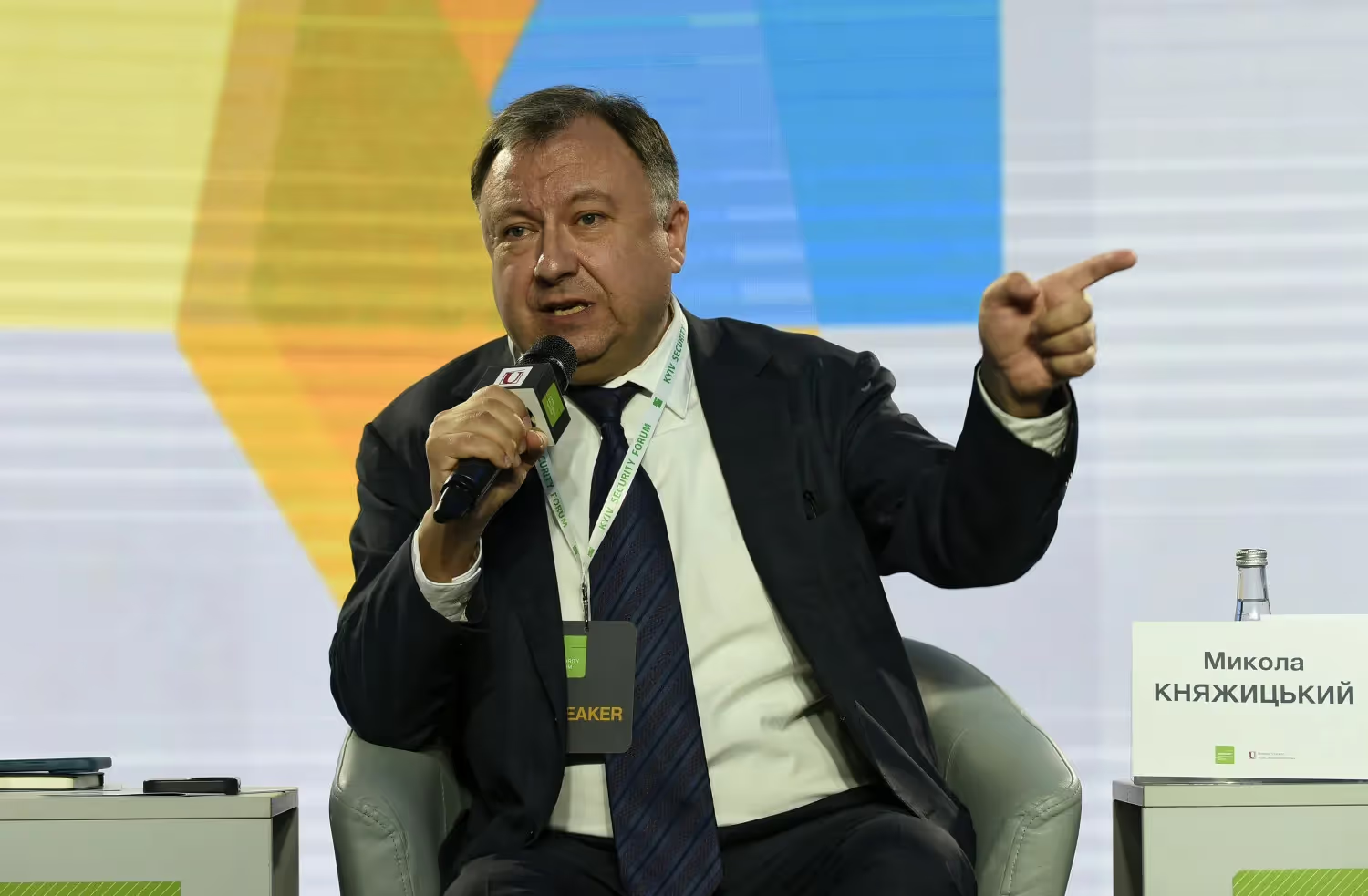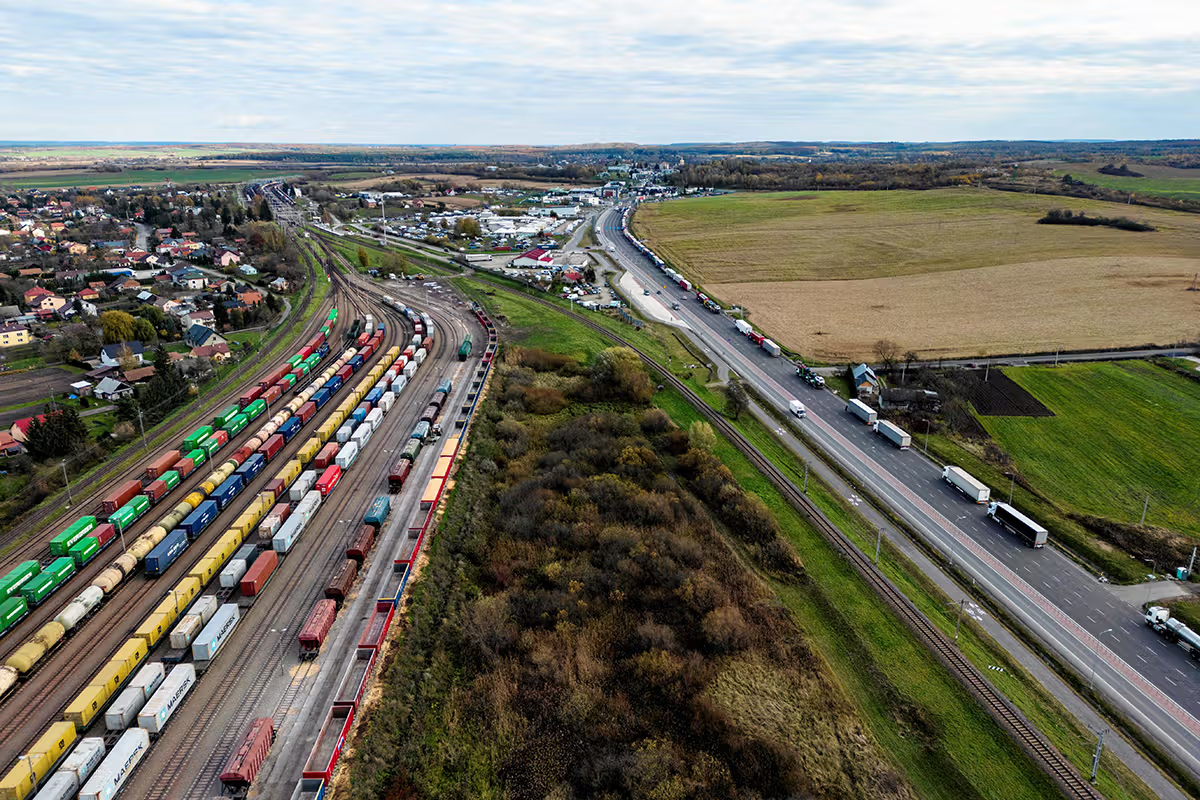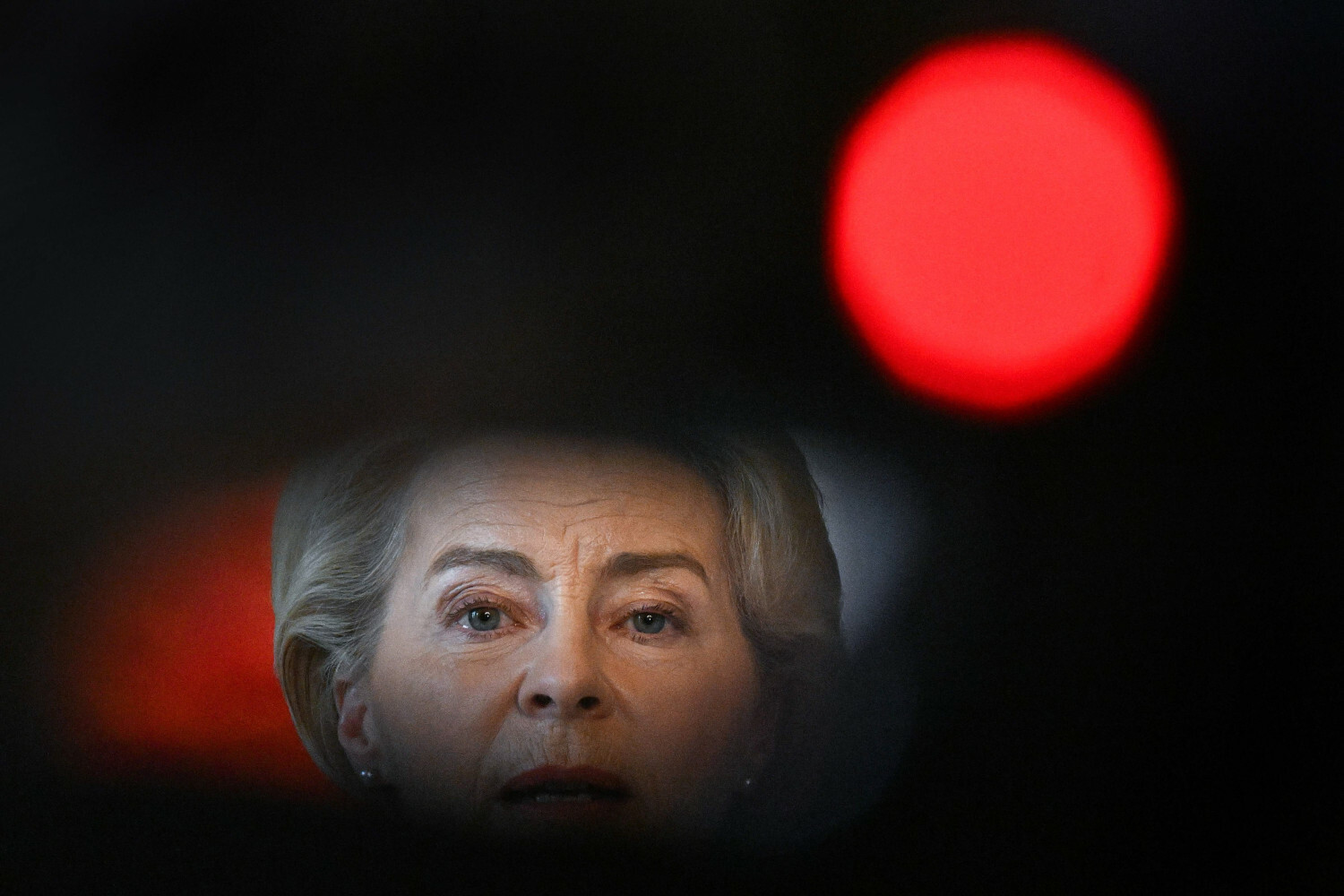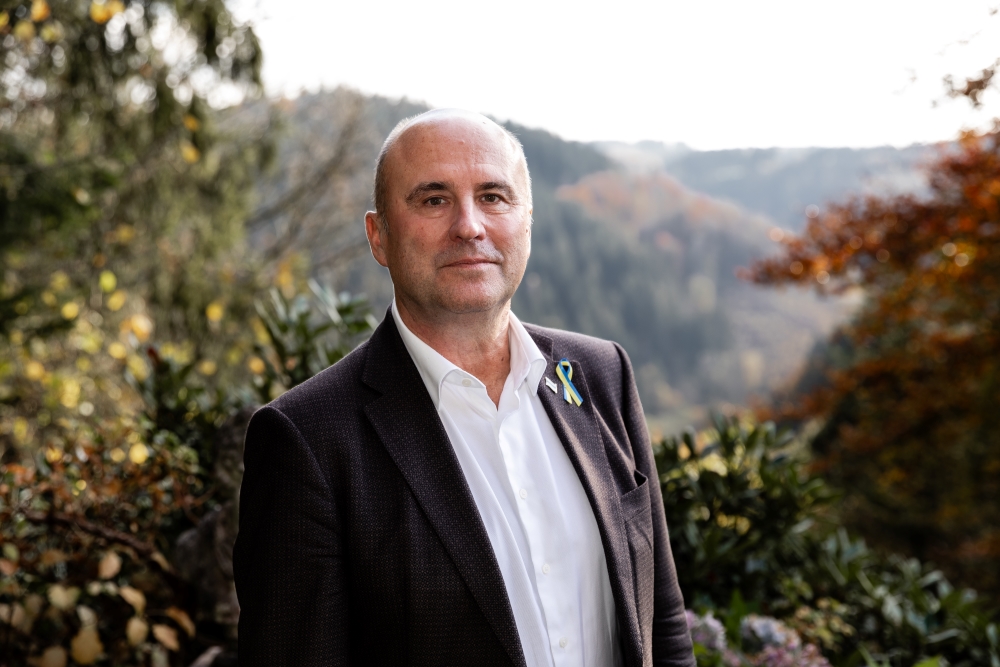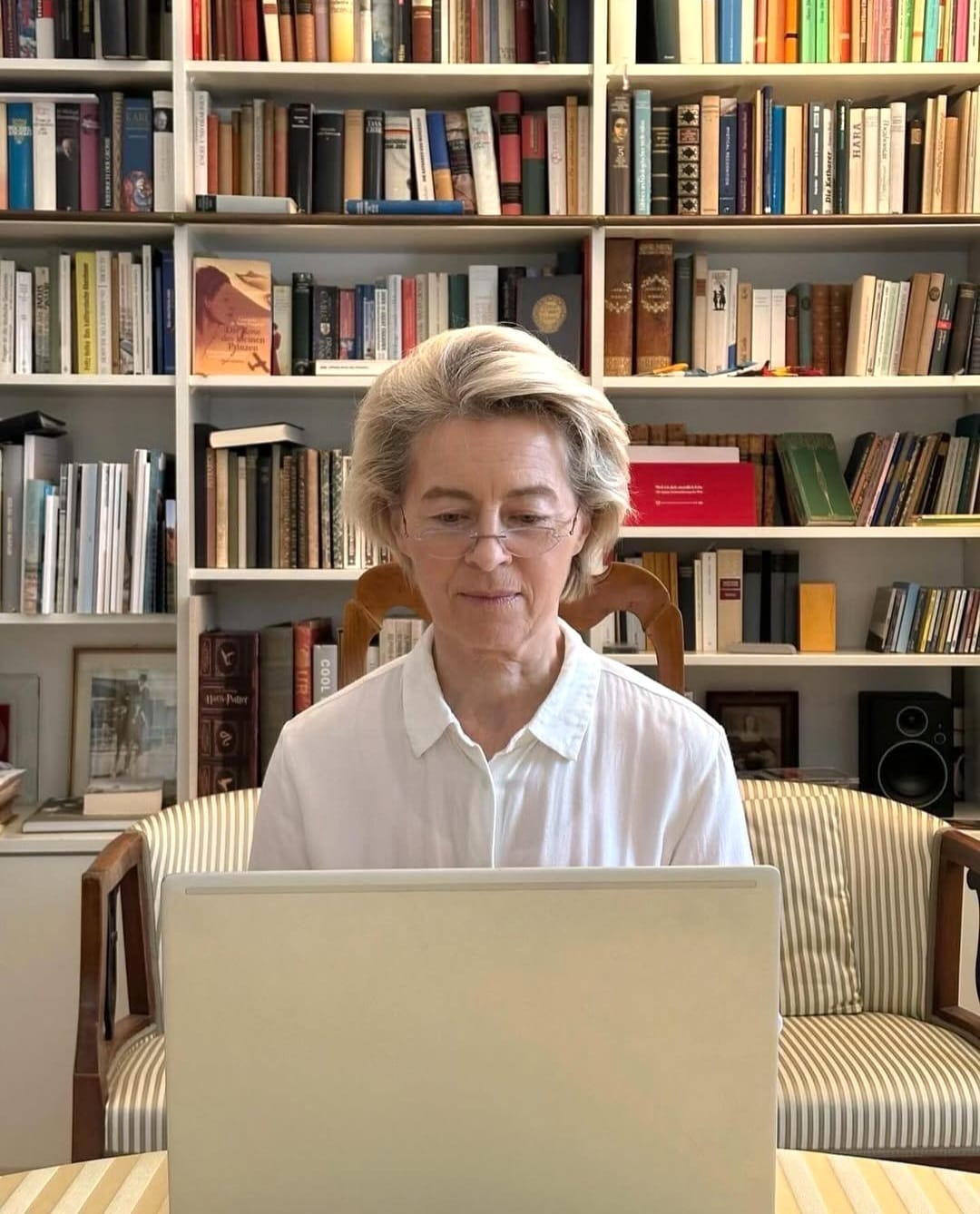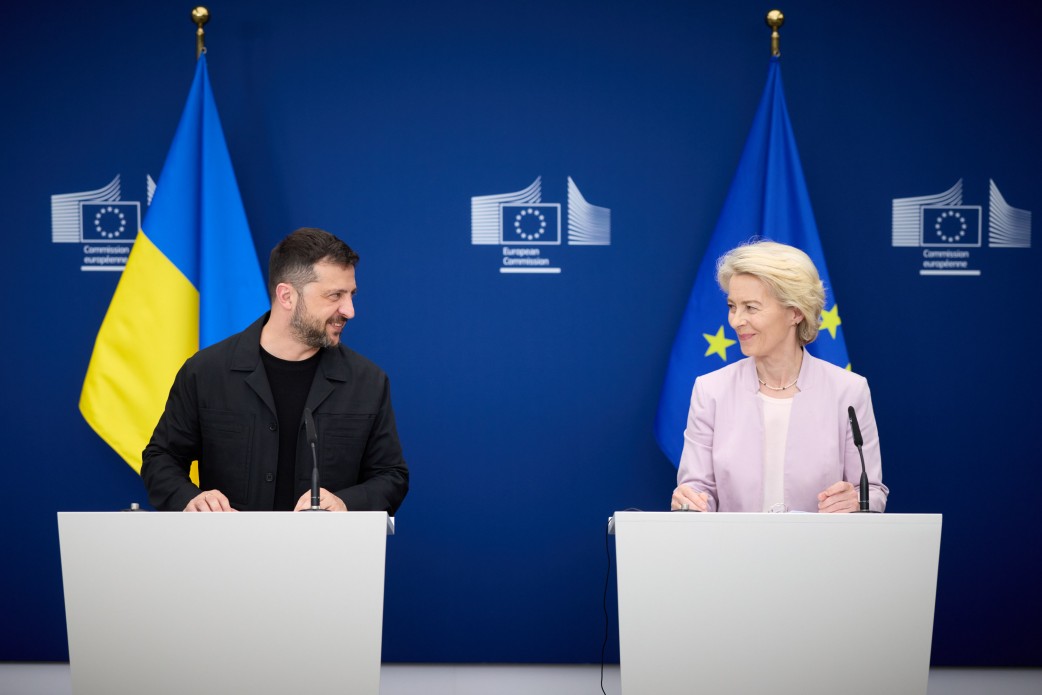Support Sestry
Even a small contribution to real journalism helps strengthen democracy. Join us, and together we will tell the world the inspiring stories of people fighting for freedom!
Марія Гурська: Більше трьох тижнів триває блокада кордону польськими перевізниками. Польські медіа з посиланням на організаторів протесту говорять, що глибинні причини полягають у корупції на кордоні з українського боку, яка, власне, призвела до дискримінації польських водіїв у чергах на пунктах пропуску. Чи це відповідає це дійсності?
Микола Княжицький: Розмови про те, що причиною блокування кордонів стала корупція з українського боку, не відповідають дійсності. Якщо вона існує, її можна перемогти — для цього в Україні існують антикорупційні органи і прокуратура, так само, як і в Польщі. Польська й українська прокуратури ефективно співпрацюють. Якби були б заяви про те, що на кордоні нібито існує корупція, очевидно, слідчі органи з цим би розібралися.
МГ: Але що тоді мотивує польських перевізників блокувати кордон?
МК: Передусім це політичне питання. Криза на кордоні ініційована проросійським блоком «Конфедерація» [на останніх парламентських виборах партія набрала 7,16% голосів і стала п’ятою, яка подолала п’ятивідсотковий бар’єр і пройшла до Сейму. — Ред.]. І, на жаль, ця політична сила не звертається до чинної влади, а очікує приходу майбутнього уряду Дональда Туска, який зможе почати свою роботу не раніше середини грудня. Поки він сформується, поки минуть усі свята — на розблокування кордону потрібен буде час. За цей час українці залишаться без необхідного їм скрапленого газу, а Україна, до слова, отримує через Польщу 25% необхідного їй скрапленого газу і входить до п'ятірки країн, які є найбільшими його споживачами. Усе це призводить до підвищення цін на паливо. Очевидно, така ситуація вигідна росіянам, які готують масові обстріли української енергетичної структури. Так звані протестувальники також стежать за тим, які саме військові вантажі надходять до України з Польщі. Деякі з них вони пропускають. А деякі, наприклад, комплектуючі для українських підприємств-виробників зброї, і далі стоять у чергах.
МГ: Все більше лунає заяв про блокаду як про операцію спецслужб РФ. Що вказує на те, що до дій перевізників на кордоні причетні росіяни?
МК: У мене немає жодних сумнівів, що це спецоперація Російської Федерації. Росіяни лише потирають руки. Це абсолютно вигідно російській розвідці. Кремль зацікавлений у тому, щоб блокада відбувалася.
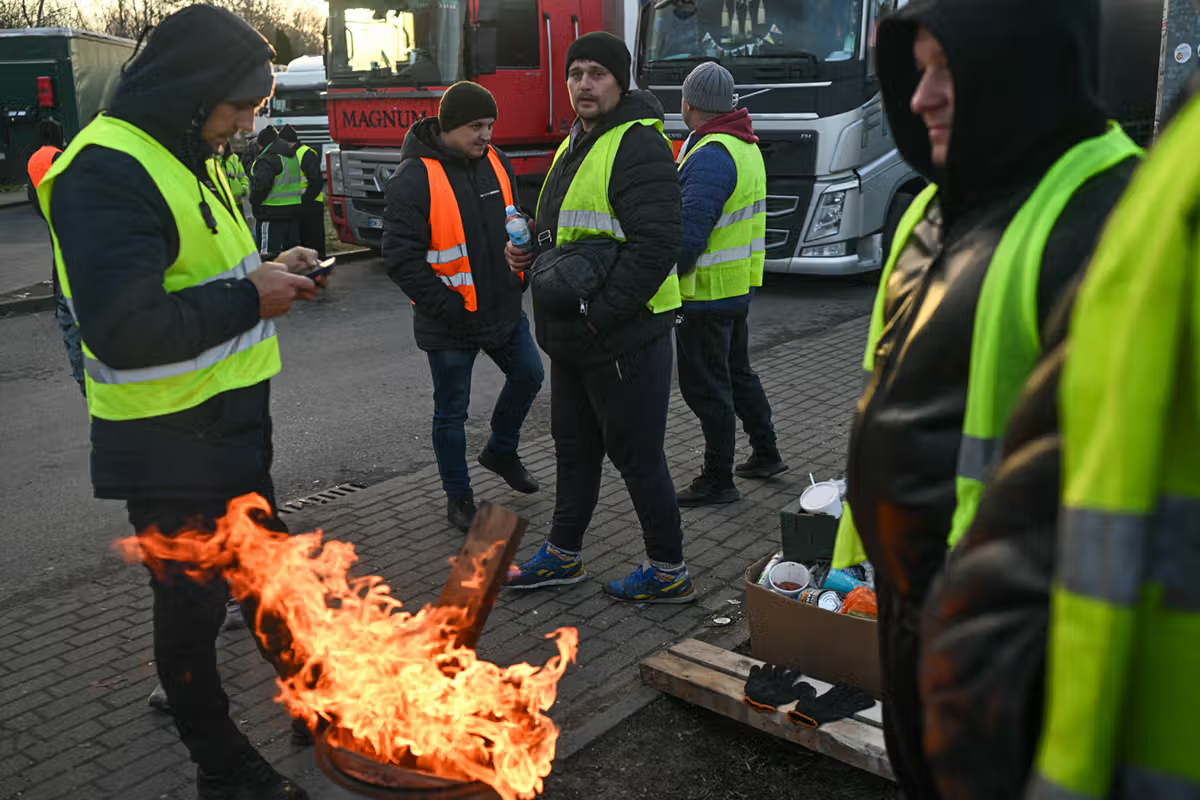
МГ: Хто стоїть за блокадою?
МК: За блокадою на кордоні стоять якісь невеликі групи людей — на кожному з пунктів пропуску по 5-6 осіб. Загалом у протесті беруть участь не більше шістдесяти перевізників. При бажанні польська поліція могла б навести лад буквально за п'ятнадцять хвилин. Однак українські водії розповідають, що коли вони під'їжджають до кордону, то саме польська поліція їх зупиняє і направляє до протестувальників. Тобто замість того, щоб завадити діям перевізників, правоохоронці сприяють їм.
МГ: До перевізників приєднались аграрії, які обіцяють стояти на кордоні до початку січня. Чому польська влада на чолі з Моравецьким мовчить?
МК: Аграрії, які приєдналися до перевізників, взагалі не мають жодних підстав протестувати. Після своїх останніх акцій вони отримали дотації і з європейського, і з польського урядів. Українське збіжжя не продається на території Польщі, сільськогосподарська продукція становить не більше 10% — в основному, все це йде транзитом. Тому це все ще раз вказує на політичний підтекст цієї блокади. Чому мовчить нинішній уряд? Бо польська влада на чолі з Моравецьким сподівається перекласти всю відповідальність на майбутній уряд Дональда Туска, який замість того, щоб почати роботу із позитивних речей, буде займатись розблокуванням кордону.
МГ: Хто страждає від цієї блокади найбільше — Україна чи Польща? Хто виграє від дій протестувальників?
МК: Від того, що відбувається на кордоні, страждають передусім польсько-українські відносини. Польща була найближчим другом України. Зараз завдається дуже сильний удар по цій дружбі. Очевидно, страждають прості люди — водії, які стоять на кордоні, польські експортери, українські отримувачі газу, українська енергетична сфера, малі і середні підприємства, які банкрутують через те, що не можуть отримати товари.
Україна, звичайно, повинна була б більше робити для того, щоб розблокувати кордон. Я особисто звернувся з листом і до міністра закордонних справ Кулеби, і до міністра інфраструктури Кубракова, де намагаюся уточнити наступне:
— чого саме вимагають польські перевізники?
— чи були проведені переговори?
— чи були задоволені потреби протестувальників?
— чи українські перевізники якимось чином порушують правило Європейського Союзу про лібералізацію автомобільних перевезень (так званий транспортний безвіз) для того, щоб вивозити продукцію з України та завозити до країни?
— чи оскаржувала Польща це рішення Брюсселю?
За моєю інформацією, нічого такого не відбувається.
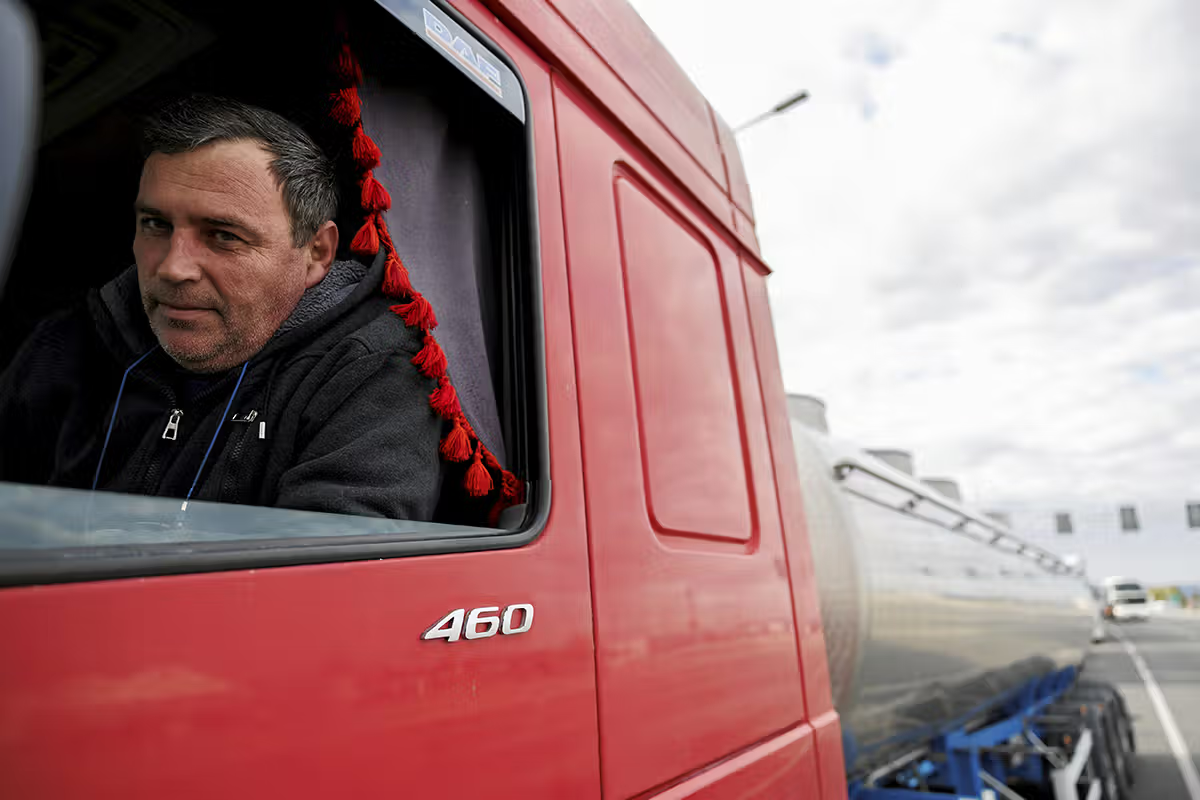
МГ: Як ви оцінюєте дії польської влади щодо подолання кризи?
МК: Цих дій нема, тож їх не можна оцінити. І, з моєї точки зору, для стратегічних відносин між Україною і Польщею — це дуже велика помилка. Незалежно від того, яка саме партія зараз при владі у сусідній країні. Я маю велику надію на польських політиків, на те, що новий уряд зможе розблокувати цю ситуацію. Але я все ж таки очікую більш активної позиції як від українського уряду, так і від нашого президента.
МГ: Серед ваших друзів є багато польських політиків. Що вони кажуть off the record про блокаду кордону?
МК: Я спілкувався з Павлом Ковалем, депутатом Сейму та головою комітету із закордонних справ, який приїжджав до Києва на роковини Голодомору. Під час свого візиту він мав низку зустрічей — і з президентом Зеленським, і з керівником ОП Єрмаком, і з міністром інфраструктури Кубраковим, і зі спікером Верховної Ради Стефанчуком. Я вірю, що на подібних зустрічах буде розроблено план розблокування кордону. Володимир Зеленський після зустрічі з Ковалем сказав, що треба трошки почекати. Мені здається, що чекати нічого не треба — люди страждають щодня. Українська влада мала б ініціювати швидше розв'язання цієї ситуації.
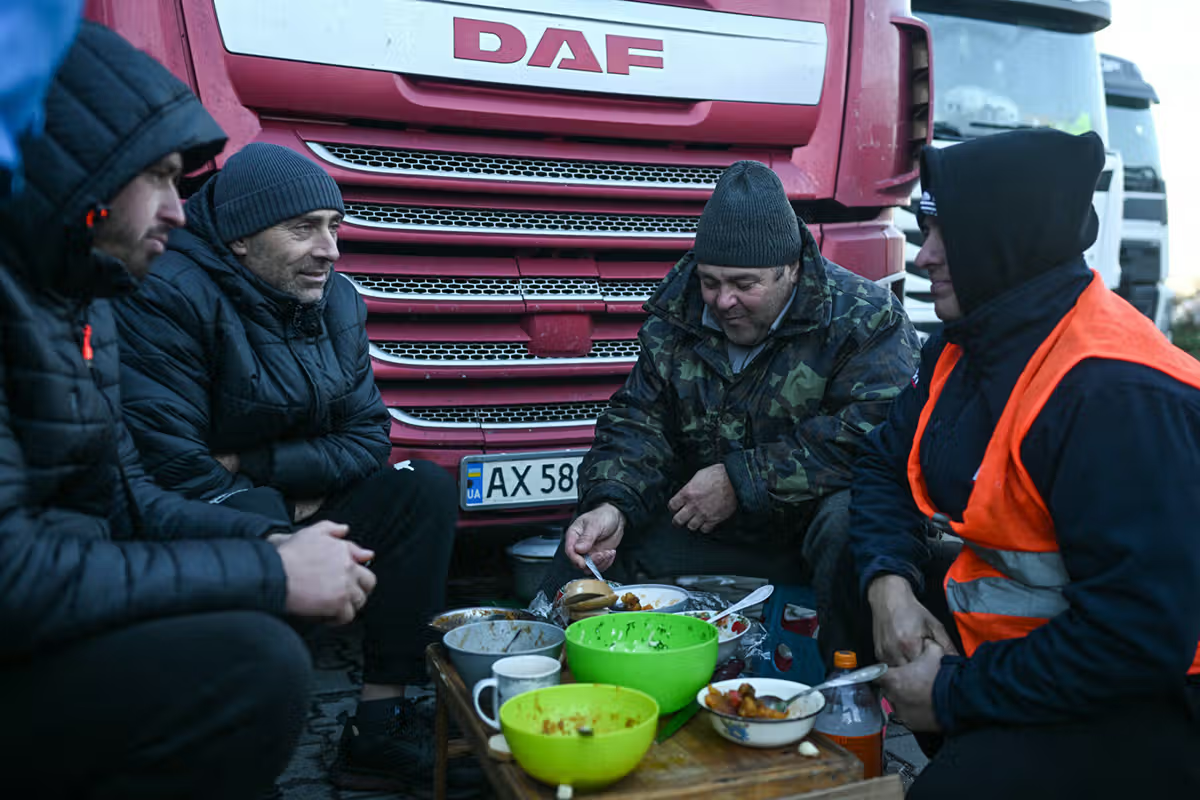
МГ: У 2024-му році у Польщі пройдуть місцеві вибори. Яку роль блокада грає у передвиборчій кампанії тієї самої «Конфедерації»?
МК: Складно про це сьогодні говорити. Я не є польським політиком, але я бачу, що польське суспільство, яке підтримало українців після початку повномасштабного вторгнення, зберегло цю підтримку. Партії, які виступали з антиукраїнськими гаслами, зокрема «Конфедерація», отримали набагато меншу кількість голосів виборців, ніж планували.
МГ: У листопаді Європейська комісія рекомендувала Європейській раді розпочати з Україною переговори про вступ. Яка роль Польщі у цьому процесі?
МК: Знаю Дональда Туска як політика, який мислить стратегічними категоріями, який обіцяв зробити все для нашої інтеграції до Європейського Союзу, і вірю, що він це зробить.
МГ: Що буде з відключеними опозиційними Еспресо, 5 каналом і Прямим [4 квітня 2022 року представники Концерну радіомовлення, радіозв’язку і телебачення вимкнули мовлення телеканалів Еспресо, Прямий та 5 каналу в цифровій мережі Т2]?
МК: У звіті Європейської комісії прямо сказано, що з українського ефіру виключені телеканали Еспресо, 5 канал і Прямий. Те, що вони згадуються у цьому документі, говорить про обмеження свободи слова в Україні. Я вірю в те, що коли в нас будуть предметні переговори про членство, Україна зробить все, щоб ці три телеканали, незаконно вимкнені з ефіру, повернулися.
МГ: Верховна Рада України у першому читанні ухвалила законопроєкт, який на території нашої країни забороняє діяльність релігійних організацій, пов'язаних із РФ. В опозиції був свій варіант відповідного документу, автор якого ви. Які кроки потрібні, щоб припинити діяльність російської церкви в Україні?
МК: Російська церква — це церква, очолювана патріархом Гундяєвим, проти якого запроваджені санкції в Україні і в багатьох європейських країнах, а також пов'язані із ним структури. Ми вимагаємо заборони їхньої діяльності, бо вони шкодять національній безпеці. Єврокомісія не може виступати проти цього закону, оскільки це повністю відповідає Конвенції про захист прав людини і практиці Європейського суду з прав людини. На жаль, український парламент затягує з ухваленням цього закону у цілому. Україна, як і будь-яка європейська країна, має дбати про захист своєї національної безпеки, жодним чином не обмежуючи релігійні права віруючих. Урядовий закон пропонує дуже складний механізм, де кожна з громад (а їх більше десяти тисяч) має пройти перевірку. Її робить якась експертна рада, яка ніде законодавчо не закріплена. У випадку, якщо вона побачить зв'язок з російською церквою, готує приписи, які можуть бути оскаржені в суді. Процес заборони російської церкви може зайняти дуже багато років. Це дозволить їй кричати про утиски прав вірних в Україні. Ми пам'ятаємо, як Комуністична партія, заборонена в 2014-му році, судилася аж до 2022-го року. Лише після того, як її лідер Симоненко втік до Росії, ця партія в судовий спосіб була заборонена. І це була одна організація, а тут ми будемо мати десять тисяч організацій. Тому я роблю все, щоб найефективніші норми з мого законопроєкту були перенесені в урядовий закон до другого читання. І мені приємно, що їх уже підтримали як представники влади, так і опозиції. Вірю, що документ буде ухвалений. Якщо ні, ми будемо наполягати на голосування за наш закон.
МГ: Щоб безперешкодно прямувати до ЄС, Україна має виконати рекомендації Венеційської комісії щодо законодавства про права національних меншин, зокрема, щодо мови, освіти та медіа. Представники владної команди в коментарях нашому та іншим медіа стверджують, що проблема з Угорщиною полягає у недосконалості закону про мову. Як автор закону про мову у чому ви тут вбачаєте проблему?
МК: Урядова ініціатива зі змін закону про мову пропонує повернути його у той період, коли він існував в редакції Ківалова-Колесніченка [закон «Про засади державної мовної політики» був ухвалений 3 липня 2012 року. Він передбачав можливість офіційної двомовності в регіонах, де чисельність нацменшин перевищує 10%. — Ред.]. Це фактичне скасування вже ухваленого закону про законодавче забезпечення української мови. Це абсолютно злочинна ініціатива. На жаль, Україна неефективно працювала з Венеційською комісією. В її висновках дуже багато суперечностей. Вони не є обов'язковими для початку прийняття України до Європейського Союзу. І Київ займав дуже пасивну позицію, коли Венеційська комісія під впливом різноманітних, в тому числі й антиукраїнських факторів, готувала свій висновок. Закон про мову і закон про освіту схвалені Конституційним Судом України. Це означає, що вони прирівнюються до Конституції. Ніхто не зобов'язує Україну змінювати свій основний закон або конституційні норми в угоду проросійським силам. Тому ми зробимо все для того, щоб, з одного боку, Україна врахувала певні побажання, які стосуються національних меншин, але щоб цілісність і ефективність закону про мову була абсолютно збережена. ЄС, як правило, знаходить вплив на Угорщину, і думаю, що і цього разу цей вплив буде ефективним.
МГ: Уже 4 грудня у Конгресі США може відбутись голосування щодо мільярдної допомоги для України та Ізраїлю. Наскільки воно, на вашу думку, буде успішним? Що може та повинна робити сама Україна, щоб переконати партнерів надавати підтримку?
МК: Я вірю в те, що ми будемо мати двопартійну підтримку у Сполучених Штатах Америки попри те, що певна група республіканців виступає проти надання допомоги. Але те, що закон, поданий у Конгрес, де йдеться про бажання одночасно підтримати й Ізраїль, і Україну, для нас дуже важливо. Вірю, що буде знайдено компроміс, й Україна буде отримувати підтримку від Сполучених Штатів Америки, оскільки її обстоюють і демократи, і значна частина республіканців.
МГ: Чого очікувати від грудневого саміту ЄС? Що може зашкодити початку перемовин про вступ України до Євросоюзу?
МК: Я вірю, що на грудневому саміті ЄС, буде ухвалено рішення про початок перемовин про вступ до Євросоюзу. Маємо докласти всіх зусиль, виступаючи в єдності, щоб Україна була запрошена до цих переговорів. А вже далі, очевидно, маємо зробити дуже велику роботу, яку багато хто в Україні навіть недооцінює. Тому що для того, щоб привести наше законодавство у відповідність до законодавства Європейського Союзу, для того, щоб захистити наше сільське господарство, місцеве самоврядування, нашу економіку, треба буде провести величезну роботу.
МГ: Ексочільник НАТО Андерс Фог Расмуссен пропонує прийняти Україну до Альянсу на ювілейному саміті, який має відбутися наступного року у Вашингтоні. Наскільки реальний такий сценарій?
МК: Я б цього хотів, але дуже складно дати відповідь на це питання. Я вважаю, що прийняття України до НАТО — це єдине, що може зупинити цю війну. У мене нема сумнівів, що на цьому саміті будуть зроблені критично важливі кроки для такого рішення.
МГ: Чи можуть Україні надати реальні гарантії безпеки для тих територій, де нема російських військ?
МК: Ми бачимо, що багато країн, які готувалися вступити до НАТО, наприклад, Швеція чи Фінляндія, отримували відповідні гарантії. І логічно було б надати такі гарантії й Україні.
МГ: Яка вірогідність того, що в Україні у 2024-му році можуть відбутись вибори — як парламентські, так і президентські?
МК: Ми не можемо проводити вибори в умовах воєнного стану, тому що це суперечить Конституції, тому що ми не можемо забезпечити голосування військових, які перебувають на фронті, ми не можемо забезпечити голосування величезної кількості тимчасово переміщених осіб як в Україні, так і за її межами. Хоча, очевидно, влада готувала ці вибори, бо бачить, що підтримка Володимира Зеленського падає. Пов'язано це з величезними очікуваннями, які були обіцяні громадянам чинною владою щодо звільнення всіх територій, щодо нашої перемоги в короткий час. Але ці обіцянки значною мірою були політичними. Люди розчаровуються, втомлюються від війни і менше вірять політикам. Особливо коли бачать, як чинна влада починає конфлікт з військовими, як деякі її представники ображають представників військового командування, представників Генерального штабу. Це впливає на рейтинг Володимира Зеленського. Демократичні вибори під час війни в тій ситуації, в якій є зараз Україна, організувати неможливо. Є різні стадії війни і різні форми війни. Зараз у нас йде гаряча стадія. Попри те, що на фронті нема особливого просування ані з боку агресора, ані з українського боку, це не означає, що бої не відбуваються. Вони відбуваються постійно. Ворог шукає слабкі місця в нашій обороні. Ми не отримуємо вчасно військову техніку, яку нам обіцяє Захід. У таких умовах, звичайно, проводити вибори фактично є неможливим і антиконституційним.
МГ: Таймс пише, що Путін підсилює мережу своїх агентів для дестабілізації України і Європи. РНБО попереджає про сценарій дестабілізації перед Новим роком — наскільки високі ризики, як маємо діяти?
МК: В Україні завжди долю майданів, долю революції вирішує український народ. Жодна інша країна не може на це вплинути. Всі майдани відбуваються лише тоді, коли є загроза українській незалежності. Зараз це проявляється у дестабілізації всередині українського суспільства. Тому українське суспільство є демократично налаштованим і виступає як проти виборів, так і будь-яких збурень, майданів чи революцій. Але це суспільство, безумовно, хоче контролювати владу, перемогти корупцію і зробити все, щоб між військовим і політичним командуванням була спільна позиція, а не чвари. Так само, як і між представниками різних політичних сил.
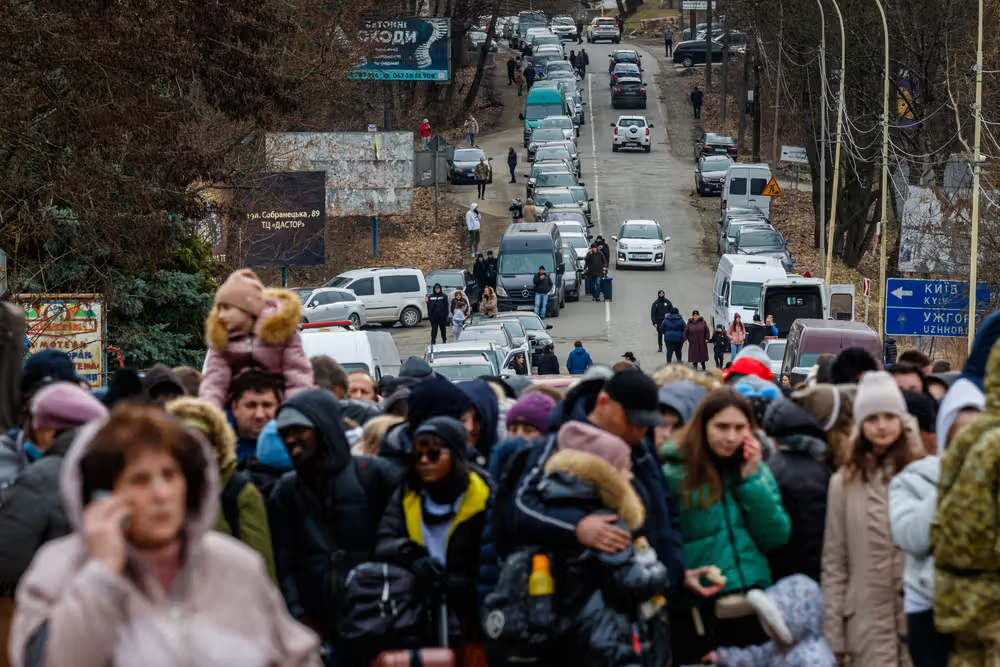
МГ: 6 мільйонів українців виїхало після початку повномасштабного вторгнення. Як це вплинуло й продовжує впливати на економіку країни?
МК: Дуже прикро, що така велика кількість людей виїхала з України. Український уряд має робити все, щоб вони якомога швидше поверталися. Багатьом насправді немає куди повернутися, тому що їхні будинки знаходяться на окупованій території або зруйновані. Але якщо Україна буде будувати демократичний лад, якщо люди будуть бачити, що у нашої країни є майбутнє, якщо буде надаватися справжня підтримка всім, хто постраждав від цієї агресії, особливо тимчасово переміщеним особам, то, очевидно, бажання повернутися в людей буде. Попри те, що багато хто хоче лишитися за межами нашої України, величезна кількість людей мріє про повернення додому.
Довідка: Микола Княжицький — журналіст, народний депутат України. До обрання у Верховну Раду працював журналістом, продюсером, медіаменеджером — пройшов шлях від кореспондента до керівника національної телекомпанії. Працюючи у журналістиці, створював демократичні проукраїнські медіа, боровся проти наступів на свободу слова. Створював телевізійні канали СТБ, Тоніс, ТВі. У 2013-му році заснував «Еспресо» — телеканал Майдану, який з перших днів цілодобово висвітлював події Революції Гідності. До парламенту вперше був обраний у 2012-му році. Як народний депутат України та член Комітету Верховної Ради України з питань свободи слова та інформації зосередив свою законотворчу роботу на професійних питаннях — регулюванні медіапростору. Очолює українську частину Парламентського комітету Асоціації Україна-ЄС та є співголовою депутатської групи з міжпарламентських зв’язків з Республікою Польща.
Титульне фото: Ruslan Kaniuka/Ukrinform/East News

Chief Editor of the online magazine Sestry. Media expert, TV host, cultural manager. Ukrainian journalist, program director of the TV channel Espresso, organiser of international cultural events significant for Polish-Ukrainian dialogue, including the Vincenz projects in Ukraine. She was the chief editor of prime-time celebrity lifestyle shows aired on STB, 1+1, TET, and Novyi Kanal TV channels. Since 2013, she has been a journalist at the Espresso TV channel, hosting the programs «Week with Maria Gurska» and «Saturday Political Club» with Vitaliy Portnikov. Since February 24, 2022, she has been a host of the wartime TV marathon on Espresso. She is temporarily residing in Warsaw, where she has actively joined initiatives to support Ukrainian temporary migrants in the EU - launching the publication Sestry with a team of Polish and Ukrainian journalists.
%20(1).avif)
